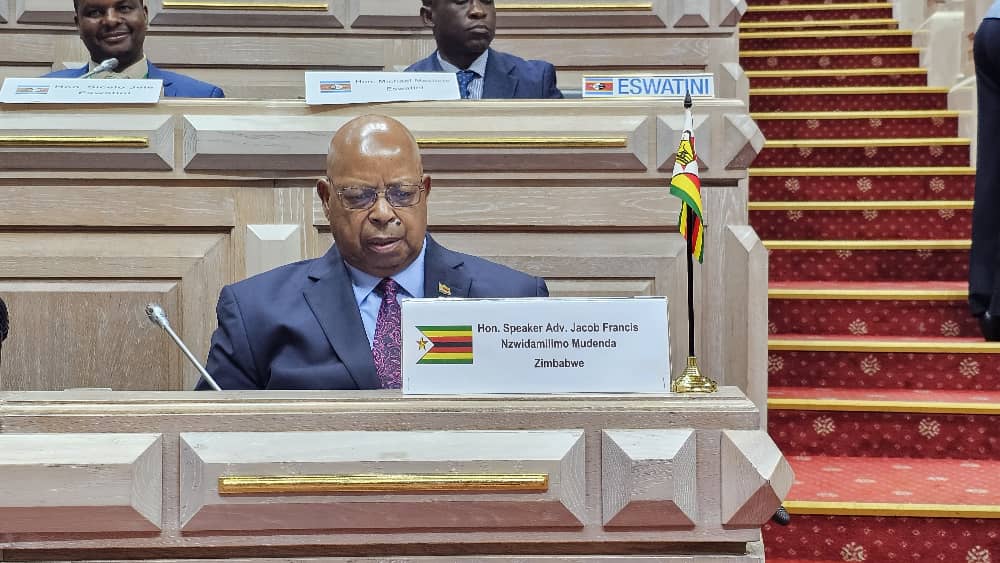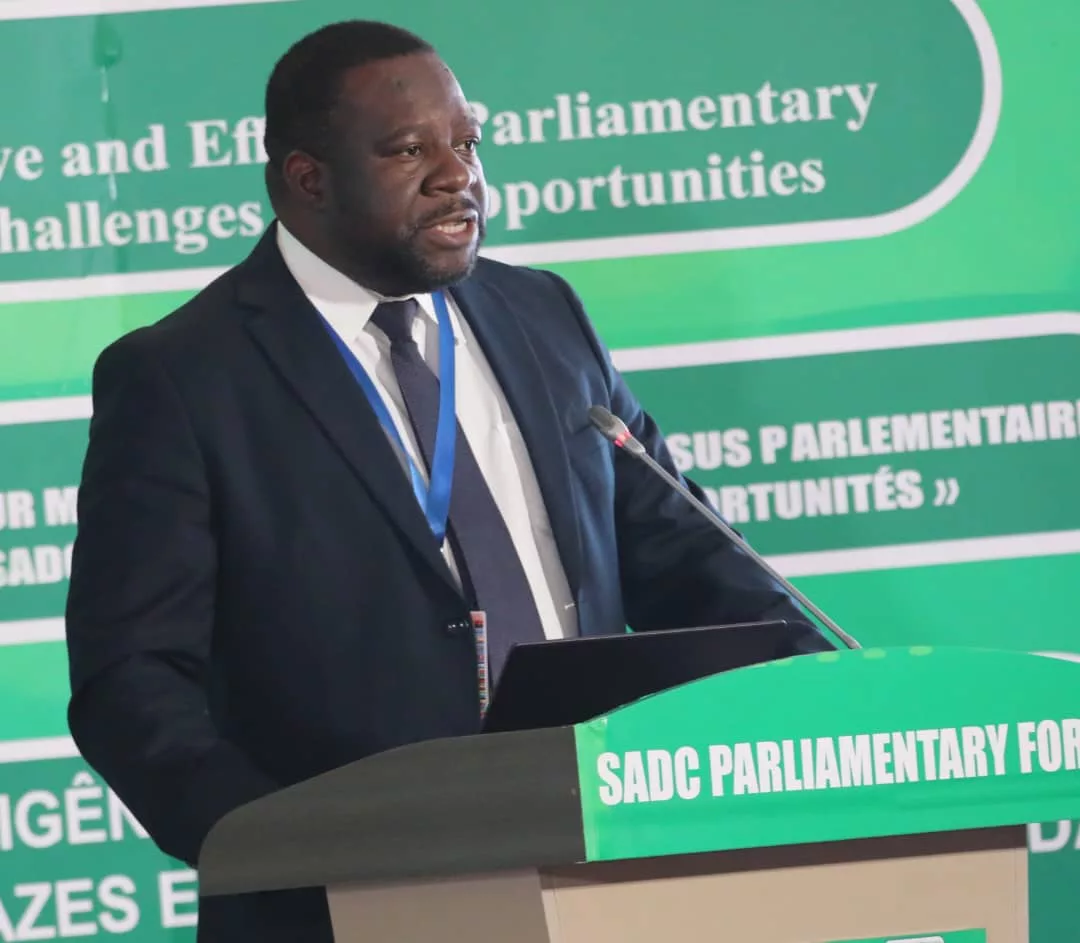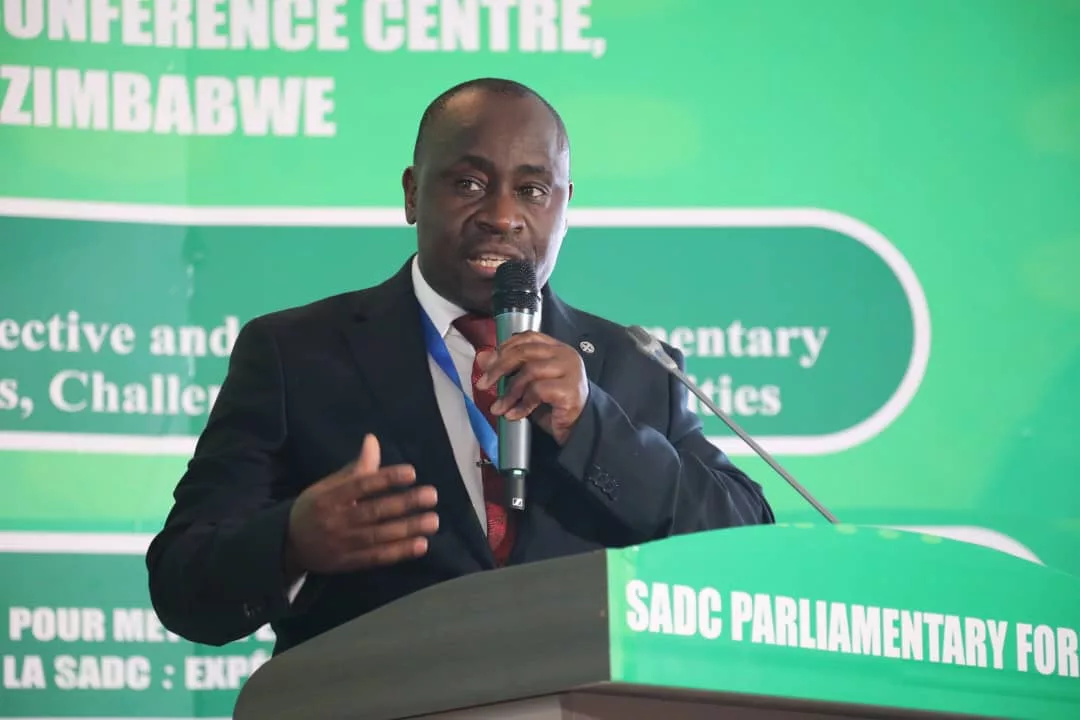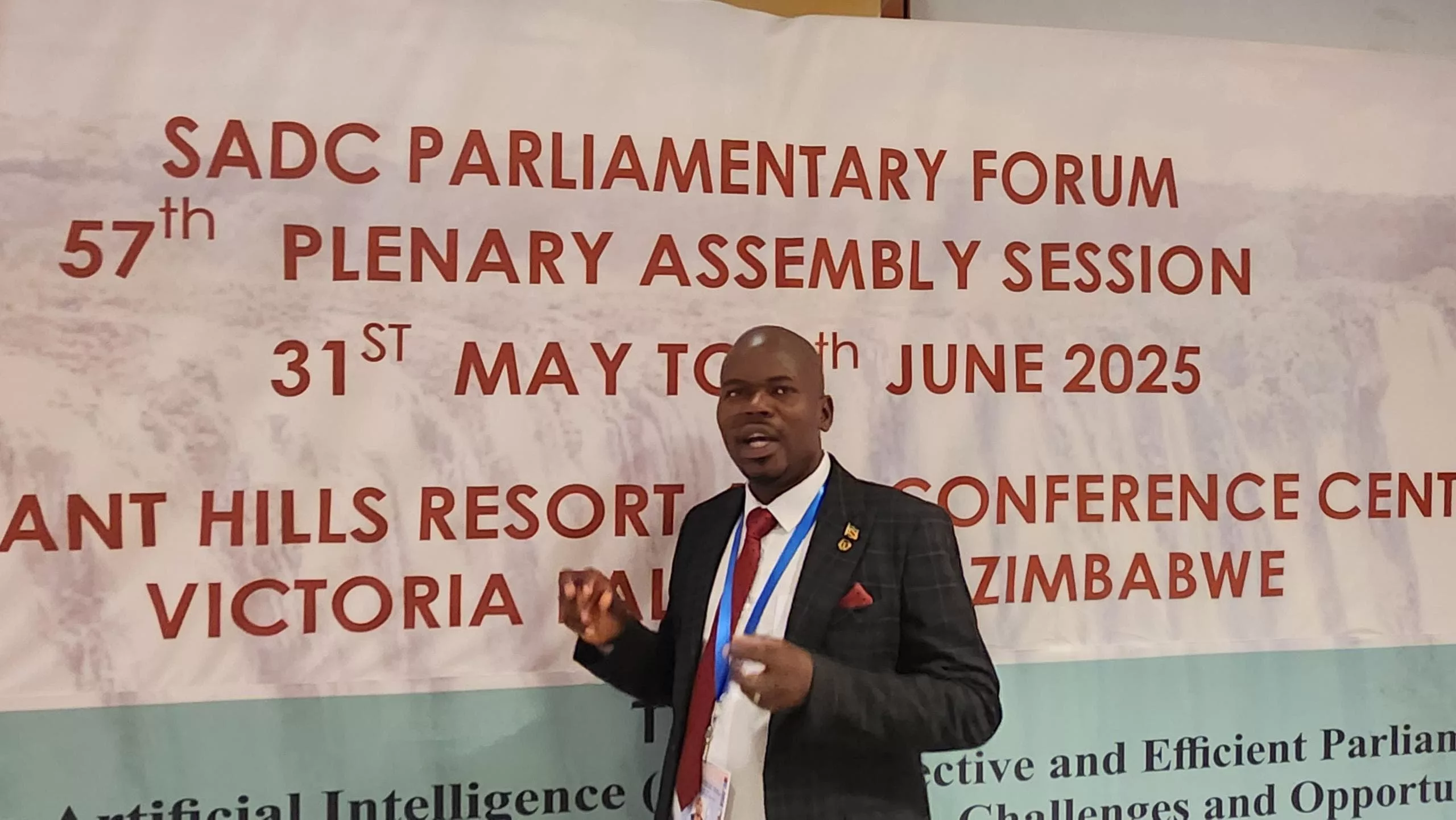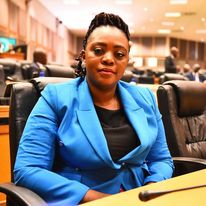|
Getting your Trinity Audio player ready...
|
On the 3rd of July 2024, during the session on the presentation of Country Reports, the Parliament of Zimbabwe presented its progress report on the Resolutions from the 54th SADC Parliamentary Forum Plenary Assembly Session held in Port Louis, Mauritius, from 22nd to 26th November 2023. The report reaffirmed Zimbabwe’s commitment to regional integration, climate resilience, gender equality, youth empowerment, and sustainable development as outlined in the resolutions adopted at the Forum.
Speaker of Parliament, Hon Jacob F.N. Mudenda’s report, ably presented by Hon. Maybe Mbowa, Member of Parliament and the Chairperson of Zimbabwe’s Women’s Parliamentary Caucus, emphasized the laudable strides made by Zimbabwe in implementing resolutions of the November 2023 Plenary Assembly as follows:
On the Resolution of the theme to promote climate justice by reducing the carbon footprint through measures in line with the Paris Agreement regularly reported to the COP:
The Parliament of Zimbabwe has established a Parliamentary Technical Committee (PTC) on Climate Change and the consequential climate action thereof. Accordingly, on 15th and 16th March 2024, this Committee conducted a climate change sensitisation workshop for all Members of Parliament, relevant Ministries and Civil Society Organizations (CSOs). Furthermore, Parliament promulgated Statutory Instrument 150 of 2023, which regulates the thriving carbon credits trading opportunities for climate action in Zimbabwe.
On the Resolution which seeks to address climate resilience in a way that mainstreams gender and ensures that the voices of women are heard in decision-making processes on disaster preparedness: A holistic Climate Change Bill will be under consideration during the current session of the 10th Parliament. The Bill will operationalize the National Climate Change Fund to effect climate action in Zimbabwe.
On the Resolution to organise digital skills training programmes for rural women to enable them to effectively use digital technologies: The Universal Service Fund, managed by the Postal and Telecommunications Regulatory Authority of Zimbabwe (POTRAZ), has launched a skills development programme targeting citizens in rural areas, including women and girls who were trained in digital skills and literacy.
On the Resolution on influencing governments to domesticate the SADC Model Law on Gender-Based Violence. Zimbabwe has enacted the Domestic Violence Act. Additionally, in January 2024, Zimbabwe launched the National Strategy (2020 -20230) to prevent and address gender-based violence (GBV). Five One Stop Centres have been established to strengthen the multi-sectoral response to GBV.
On the Resolution to call upon SADC Member States to increase funding towards education and to further create synergies with stakeholders in the education sector:
The Zimbabwe Parliament has consistently shown a strong commitment to education by consistently increased budget allocations with the Ministry of Higher and Tertiary Education receiving 3.86% of the national budget in 2022, 3.73% in 2023 and 4.64% in 2024. Additionally, Parliament also allocates funds for the Basic Education Assistance Module (BEAM) to support indigent learners at Primary and Secondary level.
On the Resolution to encourage Governments of Member States to review the education curriculum since most curricula have become relics of the colonial legacy and are out of sync with the demands of the modern world:
Zimbabwe has crafted the new heritage-based 5.0 education curricula anchored on teaching, research, community service science and technology.
On the Resolution to take urgent and deliberate measures to encourage and facilitate youth participation in electoral processes by creating policies and frameworks that reflect the needs and concerns of young people, amplifying their voices through organised platforms for engagement, and making electoral fees affordable for young people to enable their participation:
The Zimbabwe Parliament passed the Electoral Amendment Act in 2023 pursuant to Constitutional Amendment 2, which introduced a ten-member youth quota in the National Assembly. Furthermore, the Zimbabwe Parliamentary Youth Caucus attests to Parliament’s commitment to amplifying the voices of young people in the Parliamentary processes. Additionally, Parliament annually hosts the Junior Parliament and the Junior Councils to debate policy issues affecting the youth such as access to education, digital technologies, drug and substance abuse as well as gender-based violence.
On the Resolution calling for immediate actions to counter the recruitment of youth by rebel groups and their susceptibility to violent extremism by offering enhanced educational and economic opportunities to engage them constructively alongside implementing reforms to safeguard the rights of young people in the region:
Zimbabwe has established 68 Vocational Training Centres (VTCs) and 15 satellite VTCs dotted across all Provinces to provide life and entrepreneurial skills to school leavers. Recently, the National Youth Service programme was launched in order to instil patriotism, leadership and civic responsibility among youths in Zimbabwe. The Youth Bill is being crafted to ensure holistic youth empowerment.
On the Resolution to urge Member States to avert debt distress by pushing for stronger coordination between multilateral, bilateral and private creditors to offer debt relief to all countries in or at risk of debt distress, including reforming the Common Framework for debt treatment by making the process more efficient, transparent and inclusive:
The Government of Zimbabwe has initiated a comprehensive Arrears Clearance, Debt Relief and Restructuring Strategy in collaboration with the African Development Bank and former President Joaquim Alberto Chissano.
On the Resolution to call upon SADC Members States to promote inclusivity and gender responsiveness towards climate change while at the same time, implementing the Paris Agreement:
Zimbabwe has launched its Climate Change Gender Action Plan[1] aimed at the systematic mainstreaming of gender in all climate actions in both the public and private sectors.
On the Resolution to prompt SADC Member States to formulate legal frameworks that compel miners to consider environmental rehabilitation and regeneration and hold miners accountable for any damage:
The Zimbabwe Environmental Management Act provides for the sustainable management of natural resources and conservation of the environment in the mining sector.
On the Resolution to pass climate financing budget and use all available instruments to mitigate climate change consequences to the people and the environment:
The Parliament of Zimbabwe has facilitated climate-sensitive policies, including the National Climate Policy and various strategies on Climate action funding has been availed as follows: US$7 million in 2022 and US$15 million in 2023. The Infrastructure Development Bank of Zimbabwe marshalling a Climate Finance Facility (GFF) of up to US$7.88 Billion by 2030.
On the Resolution to facilitate capacity-building for women and youths to promote active engagement in agriculture:
Through the Zimbabwe Farmers’ Union’s Youth Development Programme (YDP), women and youths are involved in the Pfumvunza/Intwasa, a sustainable small-holder smart agriculture conservation farming programme and are receiving ICT training for agricultural value chains and market access. The innovative resources base include the Presidential Heifer Pass-On-Scheme and 500 hectares of land for youth projects to boost farming productivity.
On the Resolution to domesticate the SADC Model Law on Eradicating Child Marriages and Protecting Children Already in Marriages and for the enforcement laws that are put in place at the national level to eradicate child marriages:
This has been complied with through a Constitutional Court ruling in 2016 which stipulated that child marriages are unconstitutional as they violate the 18 years age of majority threshold. The new Marriage Act of 2022 thus prohibits marriage for those under 18 years old.
On the need to promote cooperation between the respective Member States and BRICS:
As stipulated in section 327 of the Zimbabwean Constitution, Parliament ratified a 2024 Agreement with the Russian Federation on Science, Technology and Innovation. Furthermore, Parliament has a robust benchmarking visit programme and embarks on bilateral visits which have strengthened Parliamentary Diplomacy and cooperation with BRICS and other countries. Additionally, in April and May 2024, Speaker Mudenda led a delegation to Mozambique at the invitation of Speaker Esperança Laurinda Francisco Nhiuane Bias, which resulted in significant collaborative outcomes and the strengthening of Inter-parliamentary cooperation agreements between the two Parliaments.
The afternoon session of the Plenary Assembly received the report of the Regional Women’s Parliamentary Caucus (RWPC) on the theme “Enhancing the Role of Parliament in Empowering Women for Economic Prosperity in the SADC Region: Removing Barriers to Women’s Financial Inclusion”. In her contribution, on behalf of the Zimbabwe delegation, Hon. Lynette Karenyi emphasized the need for practical measures to ensure women’s access to resources and equal opportunities in all spheres as mandated by Sections 17(c), 56(2) and 80(1) of the Zimbabwe Constitution. She highlighted the criticality of national legislation such as the Immovable Property Prevention and Discrimination Act (1998), the strategic initiatives like the National Financial Inclusion Strategy (NFIS) (2022-2026) and the Broad-Based Women’s Economic Empowerment Framework (BBWEEF) all of which advance women’s financial inclusion. She commended the establishment of the Zimbabwe Women’s Microfinance Bank in 2018 by the Government and the creation of Women’s Desks/Units in banks as key steps towards enhancing financial services for women, particularly in rural areas. She recommended that Parliaments foster a culture of inclusion in the financial sector, provide oversight on financial regulations, hold Governments accountable for implementing policies that promote women’s economic empowerment as well as prioritizing gender-sensitive budgeting to support women and girls.
The Plenary Assembly concluded its deliberations of the day by considering the Report of the Standing Committee on Gender Equality, Women Advancement and Youth Development. The Report focused on the theme “A Collaborative Approach in Addressing Violence Against Women in Elections and Politics in the SADC Region: The Role of Parliament.” The Committee recognized the pervasive issue of violence against women in politics and elections. It emphasized the need for a level playing field, training programmes and the demystification of discriminatory cultural values. The Committee recommended comprehensive measures, including creating complaint mechanisms within political parties, criminalizing violence against women during elections, raising awareness and ensuring support and justice for victims thereof. The Committee further called for SADC Member States to adopt holistic measures to the conundrum faced by women in politics and during elections. Furthermore, the Committee called for research into the issue and the enactment of laws to protect women’s participation in politics.
In Zimbabwe, there are constitutional guarantees that protect citizens’ rights to participate in political processes free from discrimination and violence. Section 52 of the Zimbabwe Constitution ensures the right to personal security while Section 53 prohibits torture and degrading treatment. The Domestic Violence Act (Chapter 5:16) offers protection for GBV victims and the Gender-Based Violence Policy Framework addresses GBV comprehensively, including violence against women in politics.
At the regional level, Parliamentarians were implored to pass resolutions condemning electoral violence against women and that investigative committees be established, and that violence against women in politics be criminalized. Resources must be allocated to support women’s participation in politics so as to raise public awareness and implement protective measures. Resources must be allocated to develop guidelines for handling cases of electoral violence against women in politics. These combined efforts aimed at creating a safer and more inclusive political environment for women must be sustained.
The Plenary Assembly meeting is continuing today 4th July 2024, to receive further reports of the Standing Committees, including the reports from the Democracy Governance and Human Rights Committee, the Human Social Development and Special Programmes Committees.


